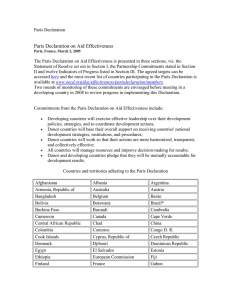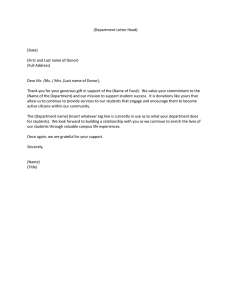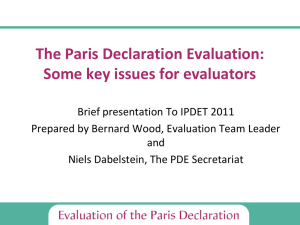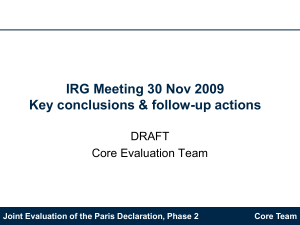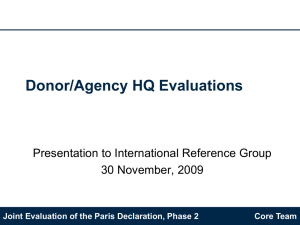Workshop on Lessons Learned from the Declaration Paris, 6-7 February 2012
advertisement
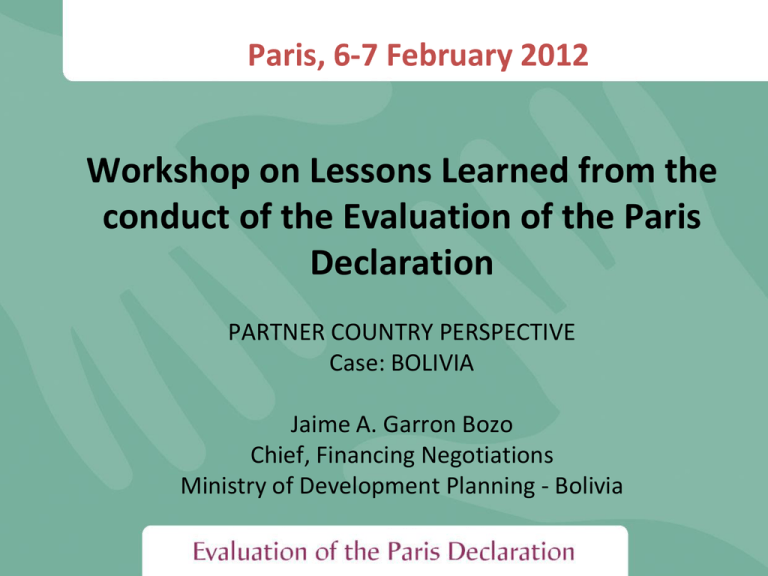
Paris, 6-7 February 2012 Workshop on Lessons Learned from the conduct of the Evaluation of the Paris Declaration PARTNER COUNTRY PERSPECTIVE Case: BOLIVIA Jaime A. Garron Bozo Chief, Financing Negotiations Ministry of Development Planning - Bolivia CONSENSUS BUILDING – DONOR COMMUNITY 2000 Millennium Development Goals 2001 2002 2003 Monterrey Consensus 2004 Marrakesh Roundtable High Level Forum in Rome 2005 2006 2007 1st PD Survey Paris Declaration 2008 2nd PD Survey 2009 2010 2nd PD Evaluation 1st PD Evaluation Regional Forum on Alignment and Harmonization for LA and the Caribbean – Santa Cruz Accra Agenda for Action • In December 2006, the donor community in Bolivia established the Develpment Partner´s Group (GRuS), in order to promote the principles of ownership and alignment. (16 bilaterals, 6 multilaterlas + 1 intergovernmental). • With in GRuS, it was created an ad hoc group in order to follow the Paris Declaration Evaluation. CONSENSUS BUILDING - GOVERNMENT • The international agenda in development cooperation is full of political commitments… ODA in Iberoamerican Countries (2000-2009) US$ Millions • Multiple Fora + Multiple Actors = Multiple Commitments • RELEVANCE of the Paris Declaration: Quantitative targets Monitoring and evaluation. • To date, +130 partner countries and development partners have adhered to the Declaration Developing Countries Iberoamerican Countries WHAT WORKED WELL: EVALUATION STRUCTURE • COMMITED DONOR FOCAL POINTS • The Dutch Embassy and the Spanish Cooperation Agency for Development acted as an excellent conduct to coordinate the work undertaken with the donor community • POLITICAL WILL AT THE NATIONAL COORDINATION • Ministry of Development Planning • EXPERIMENTED NATIONAL EVALUATION TEAMS • INDEPENDENT FIRM: STRATEGY ADVISORS FOR GOVERNMENT REFORM (SAX gr). • INDEPENDENT FIRM: SUPPLEMENTARY STUDY ON TECHNICAL ASSISTANCE WHAT WORKED WELL: EVALUATION STRUCTURE • NATIONAL REFERENCE GROUP • MINISTRY OF DEVELOPMENT PLANNING • MINISTRY OF FOREIGN AFFAIRS • DUTCH EMBASSY – DONOR FOCAL POINT • SUBNATIONAL GOVERNMENTS: FEDERATION OF MUNICIPAL ASSOCIATIONS • CIVIL SOCIETY REPRESENTATIVES: • 3 ROUNDS OF MEETINGS • CONSORTIUM OF NGOs – UNITAS • COMMUNITY BASED REPRESENTATIVE • ACADEMIA: EXECUTIVE COMMITTEE OF UNIVERSITES • COMPRISING ALL MAJOR PUBLIC UNIVERSITIES METHODOLOGY PHASES OF THE EVALUATION 1 Preparation 2 Instruments Design 3 Field Work 4 Validation and data Gathering 5 Presentation COVERAGE • 13/20 Agencies participated • 87 interviews to Civil Society, Government and Donors representatives • 13 forms filled by cooperation agencies • 3 focal groups • 2 Workshops LEARNING PROCESS Challenges • Time frame: late start of the evaluation. • Involving stakeholders to undertake a peer review (NRG) is very challenging, based on past behavior. Should be done more often. • Involving emerging “Non-Paris” donors in the evaluation proved to be difficult, including major South-South providers. • Difference in information recording (government and donors). • Lack of conceptual agreement and mutual understanding (i.e. technical cooperation). • Evaluation timing matched the budgetary process (difficulty to conduct in depth interviews) • Staff mobility (institutional memory) • Unrecorded information led to an exhaustive revision of aid agreements (tied aid, preconditions, etc.) • Lack of substantive evidence in some cases, to make a stronger case. INTERNATIONAL AND NATIONAL CONTEXT 2000 2001 Millennium Development Goals 2002 2003 Monterrey Consensus 2004 2005 Marrakesh Roundtable High Level Forum in Rome Paris Declaration Sánchez de Lozada Presidency Political Context Public Policy and Regulatory Framework 2004 2005 Eduardo Rodríguez Presidency NATIONAL 2009 2010 2nd PD Evaluation 1st PD Evaluation 2006 Evo Morales Presidency Accra Agenda for Action 2007 2008 Recall Referendum AAA 2009 2010 Constituent Referendum President Morales Re-election Constituent Assembly Carlos Mesa Presidency National Dialogue for a Productive Bolivia National Dialogue Law 2235 PD 2008 2nd PD Survey Regional Forum on Alignment and Harmonization for LA and the Caribbean – Santa Cruz 2000 2001 2002 2003 Bolivian Strategy for Poverty Reduction (EBRP) 2007 1st PD Survey INTERNATIONAL National Dialogue 2006 Adjusted EBRP Bolivia s Productivity and Solidarity Plan National Development Plan Constitutional Reform Law 2650 Hydrocarbons Law 3058 LOPE Law 3351 Supreme Decree 27329 for Government transparency and information access Supreme Decree 29322 for the Nationalization of Hydrocarbons Law 031 for Autonomy and Decentralization Framework Supreme Decree 29308 for the regulation of external resources Law 041 Against Corruption and Illicit Enrichment and Investigation of Wealth LEARNING PROCESS Opportunities • Independent evaluation. • Exchange of ideas and feedback from the Core Team and the possibility of accessing the extranet of the Evaluation of the Declaration of Paris. • Having a Reference Group involving main stakeholders facilitated dialogue, although not as frequent as expected • South-South cooperation with the Colombian evaluation team. • Political and operational support of the Government. • Openness to provide information on behalf of international cooperation. • Knowledge and expertise of the national evaluation team. • Provided valuable inputs for developing the Action Plan to Strengthening Development Cooperation Effectiveness in Bolivia, presented in October 2011 to the Executive Branch, and Donor Community.
